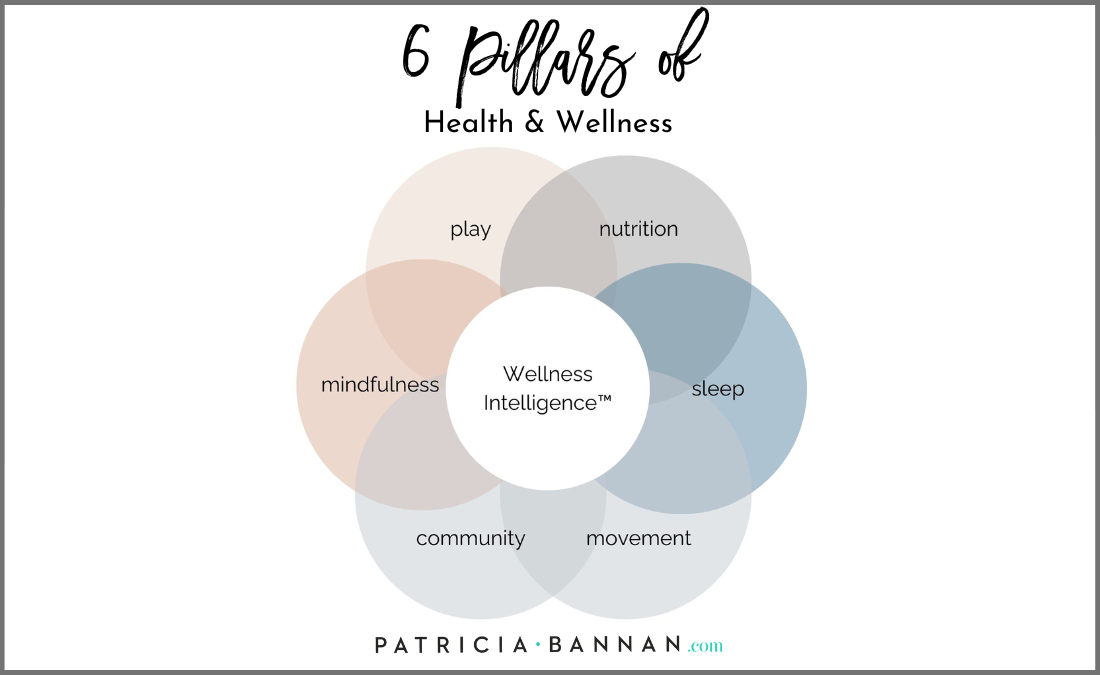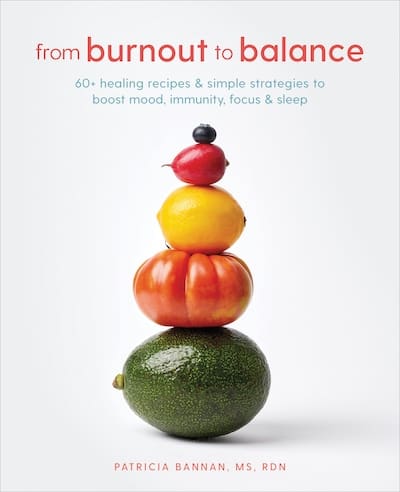Feeling burnt out and struggling to stay on a path of healthy living? Learn how to strengthen these six key pillars of health and wellness for a joyful, healthy foundation.
If you’re feeling burnt out and finding it hard to prioritize your well-being, you’re not alone. The stressors of life and work can take a toll on your mental and physical health, making it challenging to stay on track. While there’s no quick fix, focusing on the six key pillars of wellness can help you take small, meaningful steps toward feeling more balanced and resilient—even during life’s busiest and most stressful moments.
As the founder of Wellness Intelligence™, I’ve seen how these six pillars—when approached with small, sustainable steps—can transform lives. Let’s explore each one and how to start strengthening them today.
How Many Pillars are There?
Though there are many elements that contribute to a healthy lifestyle, I’ve chosen to arrange them into six key pillars of health and wellness when working with my clients. You might find that there are additional parts of your life that aren’t listed below, and that’s okay! Also note that there may be sub-pillars that can fit into this structure as well, such as spirituality or purpose.
Remember that each person’s journey to wellness is different—what matters most is ensuring that you approach it with your needs and health in mind.
What are the Six Pillars of Wellness?

- Nutrition
- Mindfulness
- Sleep
- Movement
- Community
- Play
Read on to learn more about each of these six pillars of wellness and the steps you can take to strengthen them in your life.
1. Nutrition

Therefore, it’s important to nourish your body with fiber, lean protein, and healthy fat for a balanced plate. This includes foods such as fruits and vegetables, legumes, nuts and seeds, fish, and lean meat.
Tips for Strengthening Your Nutrition Pillar
- Start small: Changing your whole diet can be overwhelming. Identify one aspect of your food habits or choices that you want to improve. Write down an action you can take each day to prioritize this change, such as adding a vegetable to each meal.
- Prioritize protein: While high-sugar snacks might provide a quick energy boost, they often lead to crashes later on. Opt for high-protein alternatives to sustain energy levels throughout the day.
- Plan ahead: Create a permanent grocery list with your favorite staples. This will not only reduce burnout but also prevent you from resorting to less healthy takeout options. Consider implementing monthly meal planning strategies for additional guidance.
With Wellness Intelligence™ coaching, I teach clients to create systems that make healthy eating feel effortless—even on the busiest days.
2. Mindfulness

Have you ever climbed into bed at night and struggled to recall all the events of your day? With a busy schedule, it’s easy to rush from task to task without pausing to reflect on what you’re doing.
Mindfulness is a crucial pillar of health and is often one of the most neglected. While it’s easy to overlook, there are small steps you can take to strengthen this pillar. With repetition and intention, mindfulness becomes more routine and easier to incorporate into your daily life.
Tips for Strengthening Your Mindfulness Pillar
- Pause to reflect: Take one or two minutes every time you find yourself in between tasks—whether in the elevator, while looking in the mirror, or while waiting for a meeting to start—to reflect on how your day has been going and how you really feel.
- Keep a gratitude journal: Write down one thing every day that you’re grateful for. This practice improves awareness and serves as a great connector to the other pillars of health as well.
- Say a daily affirmation: Try one of these 20 Self-Love daily affirmations or write your own. It’s important to find one that really resonates with you or that you know you want to work on.
- Take a breath: It’ll calm your system, keeping you from constantly being in “go mode.”
3. Sleep

Lack of sleep can not only result in brain fog and hasten burnout, but it can also contribute to serious health problems down the road. Experts recommend that adults get 7-9 hours of sleep each night.
While a perfect night’s sleep every night isn’t realistic, there are steps you can take to help achieve more optimal sleep. The most important thing to remember is that any small step towards balancing your pillars of health will strengthen the foundation under your feet and make the other pillars easier to achieve.
Tips for Strengthening Your Sleep Pillar
- Minimize bedtime distractions: If you have loud noise, bright lights, or other distractions in your bedroom, your sleep might suffer. Try using earplugs or an eye mask to block them out and help you sleep soundly.
- Enjoy herbal tea before bed: Consider having a cup of chamomile tea or other relaxing alternative, such as one of these teas known for their soothing properties, before bed.
- Cut down on the caffeine: It’s a vicious cycle—you don’t get enough sleep, so you drink more coffee, so you don’t get enough sleep… and so on. Break the cycle, and your body will thank you!
4. Movement

- Help take your mind off stress,
- Improve circulation and digestion,
- Strengthen your body as a whole.
You don’t have to go all out, though—simply implement what dietitians call “exercise snacks,” or small bits of movement throughout the day to keep you active and healthy.
Tips for Strengthening Your Movement Pillar
- Incorporate exercise snacks: Park further from the grocery store, take the stairs whenever possible, or stroll around your yard before bed. These small actions may not seem significant individually, but they add up over time. Consider getting a smartwatch to track your steps for added motivation and accountability.
- Messy dance: Movement doesn’t have to be pretty. If you can’t do the newest dance move or the proper Zumba choreography—who cares?! Your body doesn’t—so turn up the music and dance around.
- Be creative and work with what you’ve got: For some ideas, check out these fun indoor activities for adults and kids, helping to get both you and your children active.
5. Community

Health isn’t just internal. The next pillar of health, community, is so important for living a healthy life. Regularly seeing friends and family may not always be possible, especially with busy schedules. However, making time here and there for a quick bite, a dinner, or even an afternoon walk can fill your cup. It’s so important for longevity that it is even a common denominator in the Blue Zones.
Even a quick voice message or letter can keep your relationships strong and help you feel connected and healthy. Remember, you’re never alone!
Tips for Strengthening Your Community Pillar
- Meet someone new: Whether that’s joining a new gym group, a book club, or volunteering, it can be refreshing to engage with someone you’ve never met before.
- Find new ways to hang out with old friends: Shaking up routines can strengthen connections and add excitement to your relationships.
- Remember the word “no”: Saying “no” is always an option. Too much social time can leave you feeling tired and spread too thin. Sometimes, recharging alone is the best option for self-care.
6. Play

Play isn’t just for kids—it’s an essential pillar of wellness that helps boost creativity, relieve stress, and bring more joy into your life. Play can take many forms, from hobbies and lighthearted activities to moments of laughter with friends or family. The key is to let go of expectations and embrace the fun.
Incorporating play into your daily life isn’t just about entertainment; it’s a way to recharge your mind and body. Even small moments of play can help you feel more present, balanced, and energized.
Tips for Strengthening Your Play Pillar
- Make time for hobbies: Dedicate even 15 minutes to something you love, like painting, gardening, or journaling.
- Be spontaneous: Play a quick game with your family, watch a funny video, or doodle during a break.
- Try something new: Sign up for a dance class, experiment with a new craft, or explore a local park.
- Let go of perfection: Play is about joy, not results—messy and imperfect are part of the fun.
Putting it All Together
Wellness isn’t about doing everything perfectly—it’s about finding small, meaningful actions that make a difference. Strengthening these six pillars can help you feel more balanced, energized, and joyful.
If you’re ready to take the next step, my Wellness Intelligence™ coaching offers a personalized, holistic approach to wellness for career-driven women who want to elevate their well-being with limited time. We’ll build habits and systems that work for your unique life, helping you shift from chaos to calm in just minutes a day.
This post was updated from it’s original publish date in 2023.
References
- Steptoe A, Kivimäki M. Stress and cardiovascular disease. Nat Rev Cardiol. 2012;9(6):360-370. Published 2012 Apr 3. doi:10.1038/nrcardio.2012.45
- Kivimäki, M., Bartolomucci, A. & Kawachi, I. The multiple roles of life stress in metabolic disorders. Nat Rev Endocrinol19, 10–27 (2023). https://doi.org/10.1038/s41574-022-00746-8
- How Sleep Works – How Much Sleep Is Enough? | NHLBI, NIH. Published March 24, 2022. Accessed January 12, 2024. https://www.nhlbi.nih.gov/health/sleep/how-much-sleep





